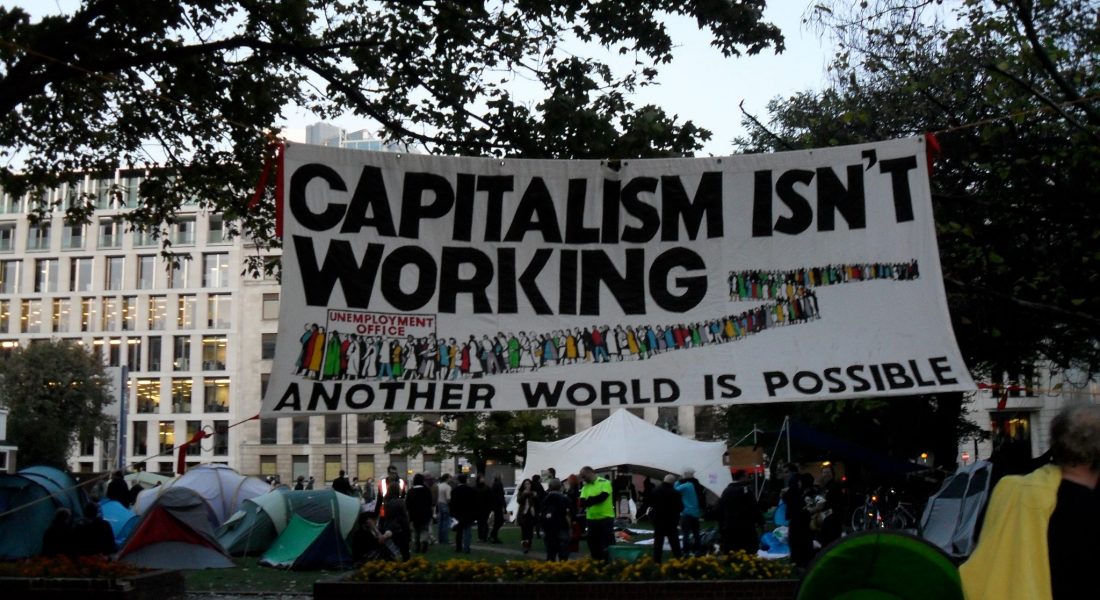Melanie

How would you define Occupy ?
Occupy was/ is a global social movement that called for systemic change towards authentic global equality, an end to corporate rule and a just economic system that has a positive impact on the natural world. As the initial statement read:
“The current system is unsustainable. It is undemocratic and unjust. We need alternatives; this is where we work towards them.”
The initial statement referenced many issues, from climate change, to tax injustice, to the arms trade, to the global oppressed. It is the perverse economic system that rewards and encourages exploitation of people and planet.
The catalyst for the Occupy movement was the massive transfer (theft) of public money to banks and the rich following the banks’ crisis in 2008. Austerity measures are permanently impoverishing ordinary people, whilst the rich continue to increase their wealth and benefit from much lower taxes.
What were you doing before Occupy ?
Working full time in law and feeling alienated because the world was dying and no-one I knew seemed very concerned about that. I was worried about climate change and involved in a couple of groups but I didn’t feel that what I was doing was worthwhile or effective.
Why did you participate in Occupy?
I was really impressed that the occupation held, and was interested to learn more about the issues being discussed in general assemblies. I felt I knew very little of the economic system. I knew about environmental issues and knew a bit about how the legal system worked, but I wasn’t familiar with concepts like capitalism and I didn’t appreciate how the capitalist system infects so many other areas of life.
I quickly made friends at Occupy and found the atmosphere intoxicating. I was socialising and making plans with people that genuinely wanted to change the world. I met people from all walks of life, of all ages. It was very diverse, at least initially. I felt intellectually challenged and hopeful that we could change the world.
What impact did Occupy have on your personal life?
It had a big impact on my personal life, it totally changed my perspective on what matters to me and broadened the range of opportunities available to me. I switched to working part time. I learned about housing co-ops (and moved into one for a time). I gained a whole new set of friends, many of whom I consider life-long comrades.
I also gained many useful practical skills such as experience in facilitation and consensus decision making, as well as direct action techniques. I have taken direct action on a range of issues that matter to me, and ran successful campaigns.
Did Occupy change the ways you think, feel and interact with the world? If yes, how so? What do you feel that you learned (or unlearned) that was unique to Occupy?
Absolutely! It gave me confidence in humanity and reminded me of the awesome power of community, shared ritual and collective action. I would not have thought it was possible for a group of strangers to come together and work towards a long term goal of democracy for a sustained period as we did. I feel that I am a better person because of things I learned at Occupy, and because of the tolerance, love and patience other people showed me.
What impact do you think Occupy has had on the economic and political situation?
Occupy certainly had the Establishment worried about its revolutionary potential at one point. In terms of the longer term impact, it has created a mass awareness around global economic injustice, and the 99% as an idea has stuck with people. I think movements tend to work in waves. Occupy created a platform that other movements have built on, including for example the Momentum movement backing Corbyn and Corbyn’s politics. Our actions have a ripple effect and it’s impossible to assess the impact of Occupy in isolation.
People that became politicised during Occupy, or who were more politicised after Occupy, have gone on to become active in other movements and campaigns on fracking, the arms trade, climate change, debt, housing, the banking system, anti racism, and many more. There is also a much broader awareness now of the intersectional nature of oppressions. A strength of Occupy, was that it sought to identify the explicit connections between different injustices.
Given the current political and economic situation, what is your view on what people can do to bring long lasting systemic change?
Get active, and do something you love! I have often found it most rewarding to be involved in local campaigns which link me to my community and enable me to develop connections in a place.
It’s incredibly important to do activism that you find personally rewarding and enjoyable, otherwise you won’t be a sustainable activist. There are many creative protest performance arts groups out there, groups like BP or not BP for example, that do high impact, but low risk mass actions against cultural sponsorship by oil companies.
Find a group that you enjoy working with and get involved!
Before Occupy, were you involved in activities related to the reasons why you participated in Occupy? (Activist groups, campaign groups, media platforms, volunteering, research, etc)
Yes
Which ones?
Eradicating Ecocide, an obscure group called Wild Law, Green Party, GBC, on the fringes of other mainly environmental groups and wrote some articles for Positive News.
Are you still involved in activities related to the reasons why you participated in Occupy? (Activist groups, campaign groups, media platforms, volunteering, research, etc)
Yes
Which ones?
Reclaim the Power, Plane Stupid, Green Party
Are you still actively working or engaged with people that you met through Occupy?
Yes
What kind of activities are you doing together?
Mainly social activities often involving a demo.